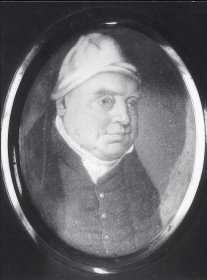Isaac Gulliver

Isaac Gulliver (1745-1822) was an English smuggler based on the South Coast. He came to control its length from Lymington on The Solent in Hampshire, through Dorset to Torbay on the Devon coast and was known as "King of the Dorset Smugglers". He was also referred to as "the gentle smuggler who never killed a man" and with his gang, ran 15 Luggers bringing from the Continent to Poole Bay gin, silk, lace and tea.
Life
He owned several farms including one at Eggardon Hill in Dorset where he planted large clumps of trees to act as navigation aids for his ships.[1] On the 5th of October 1768 he married innkeeper's daughter Betty Beale at Sixpenny Handley parish church. An extremely wealthy man, Gulliver was also able to build many grand houses, among them 'Howe Lodge', in Kinson, Bournemouth, a purpose built smuggling stronghold. When it was demolished in 1958 a number of hiding places were found within, including a secret room only accessible through a door 10 feet up a chimney.[1] It was at Howe Lodge that he allegedly covered his face in white powder and lay in an open coffin. When the customs men arrived to arrest him his wife told them he had died during the night and showed them the 'body'. When they went away, Gulliver got out of the coffin and escaped.[1]
In a report from the Custom House, Poole, to His Majesty's Commissioners of Customs in London [1788] it is mentioned that: "Gulliver was considered one of the greatest and most notorious smugglers in the west of England and particularly in the spirits and tea trades but in the year 1782 he took the benefit of his Majesty's proclamation for pardoning such offences and as we are informed dropped that branch of smuggling and afterwards confined himself chiefly to the wine trade which he carried on to a considerable extent having vaults at various places along the coast and "in remote places" . Gulliver became a respected citizen gentleman and banker. He retired to Gulliver's House, West Borough, Wimborne and died there on Friday 13 September 1822, leaving an estate of £60,000, with properties across Hampshire, Wiltshire, Somerset and Dorset. His gravestone is in the floor of Wimborne Minster.
Family
His only son, Isaac Gulliver [1774-98] died unmarried, but his daughters married into the Fryer family whose interests and wealth ranged from the Newfoundland fisheries to banking.[2] His descendants include; Sir Frederick Fryer; Lt Gen Sir John Fryer; the banker Edward Castleman, owner of Chettle House; Captain Thomas Hanham instrumental in the campaign to legalise cremation in England.[3]
See also
References
- ↑ 1.0 1.1 1.2 Hilliam, David (2010). The Little Book of Dorset. Stroud, Glos.: The History Press. p. 99. ISBN 978-0-7524-5704-8.
- ↑ http://www.thedorsetpage.com/history/Smugglers/Smugglers.htm
- ↑ The Cremation Society of Great Britain; www.srgw.demon.co.uk/CremSoc/History/HistSocy.html